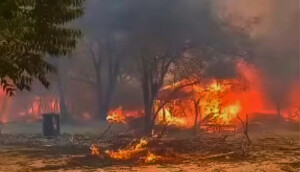Darfur displaced urge UN Security Council to keep Unamid as it is
Displaced leaders in Darfur warn for the consequences of the downsizing of the UN-AU peacekeeping mission in Darfur (Unamid).
“The adoption of a resolution by the UN Security Council to reduce the number of Unamid peacekeepers will seriously endanger the lives of the people in Darfur,” Hussein Abusharati, chairman of the Darfur Displaced and Refugees Association told Radio Dabanga.
“It simply means a continuation of the genocide war the Khartoum regime is waging against us since the rebels took up arms in 2003,” he said.
Displaced leaders in Darfur warn for the consequences of the downsizing of the UN-AU peacekeeping mission in Darfur (Unamid).
“The adoption of a resolution by the UN Security Council to reduce the number of Unamid peacekeepers will seriously endanger the lives of the people in Darfur,” Hussein Abusharati, chairman of the Darfur Displaced and Refugees Association told Radio Dabanga.
“It simply means a continuation of the genocide war the Khartoum regime is waging against us since the rebels took up arms in 2003,” he said.
El Shafee Abdallah, a senior member of the Darfur Displaced and Refugees Association and coordinator of the Central Darfur camps for the displaced, described the proposed Unamid troops reduction as “a dangerous precedent”.
“The UN Security Council did refer the case of Darfur to the International criminal court for a good reason,” he told this station.
"The Unamid forces came to Darfur in 2008 because the Khartoum regime was attacking the civilians in the region. The situation has not changed. The government is still killing, raping, and displacing the people in the region,” he stressed.
“The presence of Unamid, despite its weaknesses in implementing its mandate to protect civilians, means the presence of a body established by the international community, that is monitoring the human rights situation in Darfur.”
‘Serious danger’
Abusharati also pointed to the humanitarian situation. “If the UN Security Council decides on a reduction or withdrawal of Unamid forces, it means that they entirely ignore the dire humanitarian situation in Darfur,” he said.
“The downsizing or withdrawal of Unamid will only benefit the government and its militias. It will raise the morale of the various militias and encourage them to continue their violence against the people. It will definitely pose a real, serious danger to the Darfuris. More people will be killed and displaced.”
He strongly appealed to the Security Council not to adopt such a resolution, which he described as “ill-conceived and having nothing to do with what is happening on the ground in Darfur.
“We urgently call on the UN to send a team of inquiry to Darfur to investigate the so-called peace, security or stability on the ground. If they see with their own eyes how we are surviving, they will certainly revoke the proposal to reduce the number of peacekeepers,” Abusharati said.
"The Unamid forces came to Darfur in 2008 because the Khartoum regime was attacking civilians in the region. The situation has not changed. The government is still killing, raping, and displacing the people in the region.”
Exit
The Sudanese government began calling for Unamid to leave the country in December 2014, after Radio Dabanga exposed an alleged mass rape by army troops in Tabit in North Darfur in late October that year. Six months later, the AU Peace and Security Council stated that it was satisfied with the developments concerning the mission's exit, though it stressed the “critical importance” of a continued Unamid presence for peace and stability in war-torn Darfur.
The AU and the UN are now proposing 44 percent and 30 percent reductions in their troop and police presence in Darfur as a step towards an eventual exit.
“The reconfiguration of Unamid is an important milestone towards the completion of its mandate,” said Assistant Secretary-General for Peacekeeping Operations El Ghassim Wane on 14 June as he updated the 15-nation Security Council on the recommended changes to the peacekeeping mission.
He stated that the level of armed hostilities remained significantly lower than in previous years, noting that a successful military campaign by Khartoum has reduced the rebellion to a small presence in Jebel Marra.
On 16 June, the Sudanese government welcomed the Security Council’s plan to downsize Unamid, saying the move underscores the stability in Darfur.
‘False narrative’
In a statement on 14 June, Human Rights Watch (HRW) said that the Security Council should leave flexibility for Unamid to respond to evolving threats, and strengthen the mission’s human rights monitoring and reporting capacities.
“The planned cuts reflect a false narrative about Darfur’s war ending,” said Daniel Bekele, HRW senior director for Africa advocacy. “There is no reason to believe that government attacks on civilians and other abuses have ended since the same security forces remain in place; they have never been prosecuted for their crimes and can’t be relied on to protect civilians.”
Unamid’s report for the first quarter of 2017 found an increase in human rights violations and abuses compared with the same period in 2016, and confirmed that Sudanese government restrictions seriously hamper the peacekeepers from protecting civilians.











 and then
and then